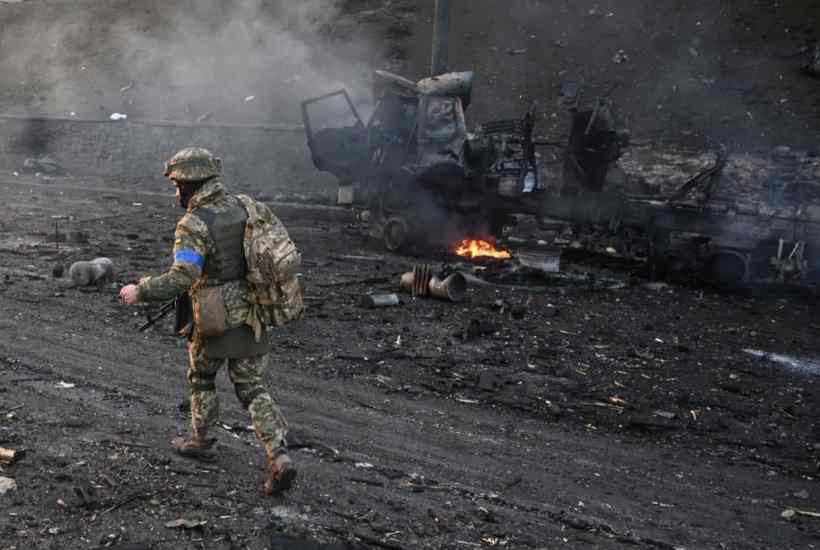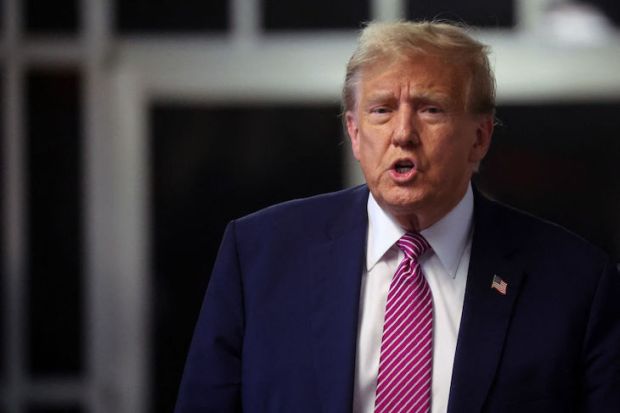Is Ukraine winning its war against Russia? Watching the conflict through Twitter or broadcast media, you’d be forgiven for thinking so. Despite its overwhelming military superiority, Russia is taking casualties, momentum is stalling, and a succession of stirring stories – Ukrainian soldiers telling Russian troops to go ‘fuck yourself’ and ordinary Ukrainians rising up to stand in the way of Russian tanks – suggests undaunted resistance. The overwhelming volume of video and audio material posted is coming from the Ukrainian side. Combined with pessimistic statements from Russian figures, this gives the impression of an advance bogged down.
Take a step back, and Russian gains on the ground have been extremely rapid; by comparison, after three weeks of warfare, the actual Battle of Baghdad still lasted six days. Kiev looks unlikely to fall within 96 hours of the war beginning; Russia very likely did not expect it to. Putin retains substantial forces in reserve, and he has the option of changing tactics should he lose his patience. To date, the strategy has been restrained by Russia’s usual standards. Despite appearances, it is has at least attempted to reduce civilian deaths. Amidst reports of cluster munitions falling on civilian parts of Ukraine, there are indications that this is now changing.
Chechnyan leader Ramzan Kadyrov described Russian tactics as ‘too slow’ and claimed Ukrainian refusal to negotiate a surrender required a change of strategy to one ‘more convincing to them’. Russia ‘must finish what we started and move forward without looking back. Come what may.’
Is Putin readying himself to adopt a far more violent approach? He has done so before. In 1994, Russian troops poured into Grozny, Chechnya. Some 105 of the 120 tanks and APCs in the first Russian assault column to enter the city were lost in a catastrophic victory. When they returned in 1999 under the leadership of a hawkish new leader (Putin) they adopted a new strategy. Planes flying over the city dropped leaflets informing civilians that anyone who failed to leave would be considered ‘terrorists and bandits’, and fair game for Russian bombs and artillery. By the time Russian forces entered the city after five months of shelling, they had difficulty finding buildings sufficiently intact to house their command posts. In Syria, in 2016, Russian forces again bombarded a city – Aleppo – with the intention of doing so ‘for as long as the bandits are still (there)’.
In Ukraine, 2022, Putin has alleged that ‘Banderites’ and ‘neo-Nazis’ are installing heavy weapons in the centre of Ukrainian cities, using the population as human shields, is losing patience with Russian casualties, and is engaging in negotiations where he is putting forward an ‘unacceptable ultimatum’. The ground has been laid for a reversion to type, and the use of thermobaric and other heavy weapons already present in Ukraine to devastate cities block by block until president Zelenskyy surrenders.
Putin’s decision to ‘move Russia’s (nuclear) deterrence forces to a special regime of duty’ should also be seen in this light. He had already stated that anyone ‘who tries to stand in our way… they must know that Russia will respond immediately, and the consequences will be such as you have never seen in your entire history’. As a reminder that the Russian regime has teeth beyond conventional forces, this threat makes considerable sense if Putin intends to further escalate the conflict in Ukraine.
There are already Western commentators and politicians making demands for the imposition of a no-fly zone, or for ground-based peacekeeping missions. Coupled with a massive shift of resources to Nato’s Eastern flank, Putin’s rhetoric looks targeted as a warning against such engagement.
The West is already deeply embroiled in the Ukraine conflict. Shipments of weapons and ammunitions are rolling across the border from Nato countries. Western government ministers state they ‘absolutely’ support their citizens going to fight against Russia. And sanctions are clearly aimed at inducing crippling economic destabilisation to force Putin into meaningful negotiations. This is all, despite the overt nature of the support, below the threshold for military response; the Cold War has plenty of examples of intense proxy conflict which never escalated.
Attempts to force Russian jets out of the air would cross that boundary. Decades of fighting technologically outmatched third world militaries have possibly eroded the point in the political consciousness that you can’t simply ‘declare’ a no-fly zone; you need to enforce it at gunpoint. It isn’t particularly clear that the West would win this confrontation if it began today. Russian air defence is plentiful and capable, and the state retains the capability to strike at the Nato airbases our jets would operate from. If Moscow believes a conventional aerial conflict would be won, it is all the more likely to attempt to call any perceived bluff. If it does, then the West will face the choice of backing down – with damage to its credibility in other statements – or entering into combat, with all the unpredictable paths for escalation that presents.
Instead of making escalatory threats, the West should remain committed to its current path. Imposing costs on the Russian state in a conflict that may be lost ensures that it recognises our commitment to such actions in the future. Maintaining current unity should also be high on the agenda; if Russia succeeds in its military objectives, then it is vital that we do not allow countries to be peeled off towards normalisation of economic relationships with a country that should be a pariah.
We can’t undo the damage our lack of preparation in Ukraine did; the conflict is in motion and is likely to end in ways we would rather it didn’t. We can prepare for, and hopefully prevent by doing so, the next one. For Europe, this course will mean massive investment in energy security – reducing the reliance on Russian gas which caused policymakers to vacillate in the face of increasingly aggressive rhetoric – and military equipment, ensuring that the ability to meet our security commitments to our allies through conventional force is beyond doubt.
Got something to add? Join the discussion and comment below.
Get 10 issues for just $10
Subscribe to The Spectator Australia today for the next 10 magazine issues, plus full online access, for just $10.



















Comments
Don't miss out
Join the conversation with other Spectator Australia readers. Subscribe to leave a comment.
SUBSCRIBEAlready a subscriber? Log in